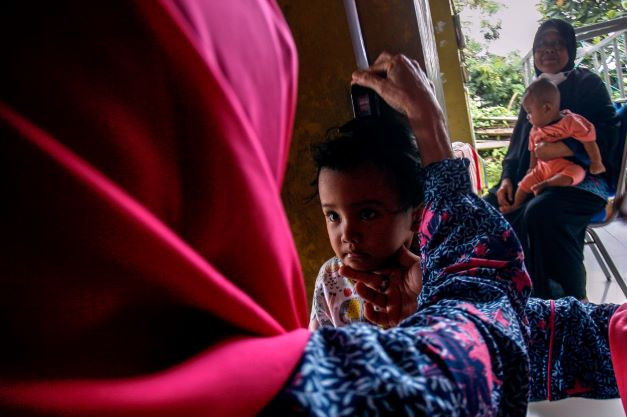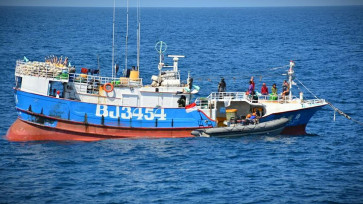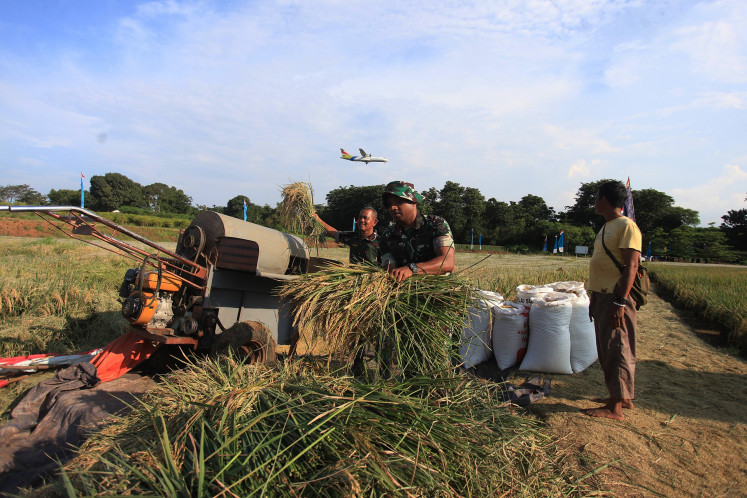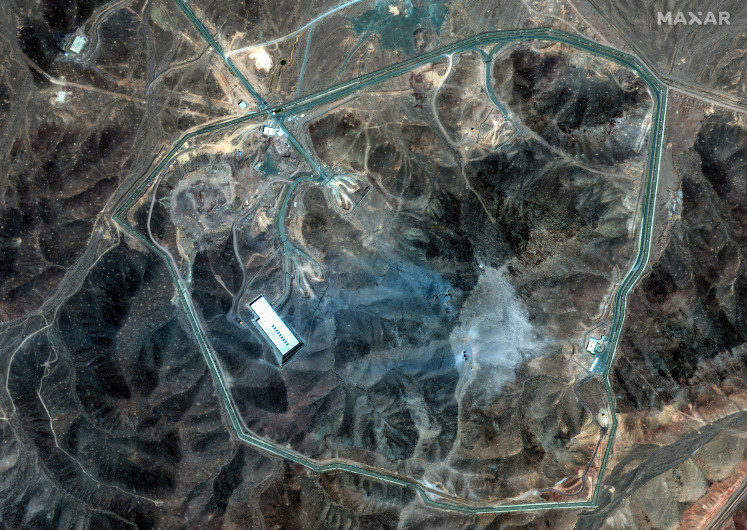Popular Reads
Top Results
Can't find what you're looking for?
View all search resultsPopular Reads
Top Results
Can't find what you're looking for?
View all search resultsWomen key to nutritional food security quality
Indonesia is facing a triple burden of malnutrition in which undernutrition coexists with overnutrition and micronutrient deficiencies.
Change text size
Gift Premium Articles
to Anyone

I
n Sukadami village, West Java, just 50 kilometers from Jakarta, Karimah, a vegetable seller, struggles to provide enough food for her children. Despite her best efforts, her youngest daughter Najwa Syaqila is affected by stunting.
Sukadami has the highest level of stunting in the greater metropolitan area. There are children like Najwa all over Indonesia. At the beginning of 2020, an estimated 7 million children under five years old were stunted.
In Tangkil village, Bogor, also in West Java, rice fields stretch as far as the eye can see. At first glance, it would seem that food security is a non-issue here. But a closer look reveals a different story. Despite the abundance of rice and being ranked 12th in the National Food Security Index2, child stunting rates in West Java remain high at 20.2 percent.
The story of Karimah and Najwa Syaqila in Sukadami village is just one example of the many families across Indonesia struggling with food insecurity and malnutrition. While the issue of stunting in children is prevalent across the country, it is one consequence of the broader challenge of food security, which is being exacerbated by the impact of climate change. The situation might even be worsened by the low levels of women’s education in the region – a key variable that can impact food security and nutrition.
In West Java, women face a significant barrier to social and economic progress: limited access to education. The head of Statistics Indonesia (BPS) West Java branch, Dyah Anugrah Kuswardarata, told a webinar last week the average length of school for millennial women in the province of West Java was only 10.11 years, or the same as junior high school and high school education only up to grade 2. This low education level among women contributes to the high rate of poverty and unemployment in the region, and also to the health and environmental awareness of issues such as climate change.
Climate change is no longer a distant threat, it is a harsh reality that is already affecting food security in many parts of the world, including Indonesia. The impact of climate change on food security has led to a significant reduction in crop yields, increased food prices and decreased food accessibility, all of which have a severe impact on children’s nutrition and development.
Changes in temperature and rainfall patterns are impacting crop yields, while more frequent droughts, heat waves and floods pose an increasing threat to the country’s development. The World Bank ranked Indonesia 12th among 35 countries that face high mortality risks due to multiple increasing hazards, including tsunamis, floods, landslides, droughts and earthquakes.
According to data from the Global Hunger Index, Indonesia ranks 70th out of 117 countries in terms of food security, with a score of 20.2. While this score indicates moderate food security, the reality on the ground is far from ideal. One of the major consequences of climate change on food security in Indonesia is child stunting, which affects 27.7 percent of children under five years old according to the Indonesia Family Life Survey.
Food security and water availability are heavily affected by climate change. Temperature increases, shorter growing seasons, unpredictable rainfall and salt-water intrusion are all expected to have a negative impact on food production. By 2100, the impacts of climate change will cost an estimated 2.5 to 7 percent of gross domestic product.
While climate change poses a significant threat to food security in Indonesia, it is not the only factor contributing to the issue. A lack of access to diverse and nutrient-rich food is another major contributor to food insecurity and malnutrition. In Indonesia, despite progress toward zero hunger, the country still faces challenges in terms of limited food access, malnutrition, gender inequality, climate change and vulnerability to natural hazards. The COVID-19 pandemic has further exacerbated these challenges and reversed years of progress in reducing poverty and food insecurity.
Malnutrition is a critical concern in Indonesia, with child stunting affecting almost 28 percent of children under five years of age. This issue is primarily driven by a lack of access to diverse and nutrient-rich foods. Indonesia is facing a triple burden of malnutrition in which undernutrition co-exists with overnutrition and micronutrient deficiencies.
It is essential that efforts are made to improve access to nutritious foods for all communities.
Yet while improving access to diverse and nutrient-rich foods is essential for addressing food insecurity and malnutrition in Indonesia, it is not the only solution. Women’s education is also necessary for improving food security and reducing child stunting. In Indonesia, women play a crucial role in addressing food security concerns, both as caretakers and providers for their families and as agents of change within their communities.
Studies demonstrate that maternal education is directly associated with better nutritional outcomes for children. Educated mothers are more likely to make informed decisions about their families’ health and nutrition. They are also more likely to have higher incomes and greater decision-making power within their households, which can translate into improved access to diverse and nutrient-rich foods.
It is essential that efforts are made to improve access to education for women and girls and to empower them to make informed decisions about their families’ health and nutrition. Research supports this notion, with several studies demonstrating the association between maternal education and child stunting.
Food insecurity and malnutrition, particularly child stunting, are major challenges in Indonesia, exacerbated by the impact of climate change and low levels of women's education. Improving access to diverse and nutrient-rich foods is essential, but it is not enough to address the issue. Educating women is also crucial as they play a vital role in improving food security and reducing child stunting.
Governments, NGOs and other stakeholders must work together to implement policies and programs that address these challenges. Such efforts should prioritize improving women's access to education, especially in rural areas, and enhancing their role in decision-making processes related to food security and climate change.
Furthermore, in the policy-making process, there needs to be greater recognition of the importance of women's contributions in this area. This includes increasing women's representation in decision-making bodies related to food and agriculture, as well as providing resources and training opportunities specifically targeted at women.
***
I Dewa Made Agung is cofounder of Indonesia Food Security Review, where Wida Reza Hardiyanti is lead researcher.









